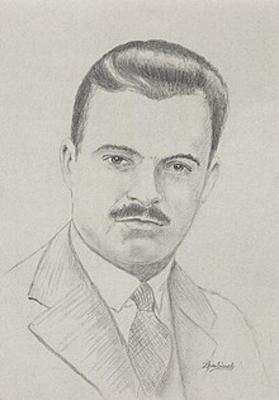Polish Consul Konstanty Rokicki and his colleagues from the so-called Ładoś Group helped to save from the Holocaust more than 800 Jews who came from the Netherlands, Poland, Germany, Austria, France, Slovakia and other European countries in 1942–43. At least twenty of the Survivors are still alive. On 9 October, a new tombstone honoring Consul Rokicki will be unveiled at a cemetery in Lucerne. President Andrzej Duda and several dozen Survivors, their families and the Rescuers’ descendants will take part in the unveiling ceremony.
An unsung hero, former Polish Consul in Bern Konstanty Rokicki died in 1958. During the war he forged more than a thousand Paraguayan passports. They helped save more than 800 European Jews, who would otherwise have fallen victim to the German “final solution of the Jewish question.” The scheme consisted in buying blank passports in return for bribes, which were then filled in with the names provided by Jewish organizations who were in touch with the resistance movement in the ghettos.
Rokicki acted with knowledge and consent of his superiors, Polish Ambassador to Switzerland Aleksander Ładoś and his deputy Stefan Ryniewicz. They provided the illegal operation with diplomatic protection and persuaded the authorities of the neutral Switzerland not to disrupt it. Other pillars of the project were Juliusz Kuehl, a man of Jewish origin only in his 30s and the holder of a PhD in economics, tasked with contacting Jewish organizations, members of the World Jewish Congress, Dr Abraham Silberschein, members of the religious organization Aguda Israel, and rabbi Chaim Eiss, who were smuggling the passports into the ghettoes.
The holders of fake passports pretended to be foreigners, and thus avoided the fate of being sent to death camps. Instead, they were sent to internment camps and sub-camps. The Polish Government in London intervened with Paraguay and a number of other countries in Latin America to temporarily recognize the passports fabricated by Consul Rokicki. In this way many of the passport holders survived the war.
For years, the story of Consul Rokicki and his colleagues was not widely known. Recent years have thrown more light on it, with publications using formerly classified documents of the Swiss police. According to them, the Swiss authorities suspected that the Paraguay passports had been fabricated by the Polish consul. These speculations were corroborated by an original note by Rokicki, found by the Polish Embassy in Bern in late 2017: its handwriting matched that of preserved passports.
Initial research by Polish diplomats, the Pilecki Institute, supported by the Jewish Historical Institute, the Institute of National Remembrance, and the Auschwitz-Birkenau State Museum in Oswiecim, which covered the so-called Ładoś list, featuring the names of all passport holders, has found that the survivors identified so far include pre-war citizens of the Netherlands, Poland, Germany, Austria, France, Slovakia, and other countries. At least twenty of them are still alive.
The list features the chief rabbi of the Netherlands, a friend of Anna Frank's, and a few professors of Israeli universities. Paraguayan passports were also issued to the leaders of uprising in the Bedzin ghetto and of the Jewish resistance in Slovakia, and a number of people who would later write their memoirs. Years later, at least one Survivor was killed in Israel's independence war. One of the Paraguayan documents features Dr Leon Rothfeld with the family, whose members included Adam Rotfeld, the future Polish Foreign Minister.
The ceremony at Lucerne cemetery will start on 9 October at 2 p.m. Polish President Andrzej Duda will lay a wreath at the renovated tombstone. Tribute to Consul Rokicki will be then paid by the Survivors, their families and descendants of the Rescuers, as well as representatives of the MFA, diplomatic corps, Swiss Jews, and the local Polish community.


